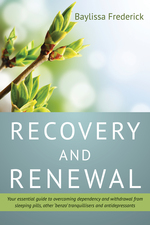Robert Granfield and William Cloud’s research provides important insights into how many people overcome substance use problems without accessing treatment. They stress the importance of recovery capital in the process of recovery from addiction. (1,920 words)
‘A Journey Toward Recovery: From the Inside Out’ by Dale Walsh
 I’ve been away visiting family this weekend and haven’t had a chance to prepare a new set of blog posts for this week. I therefore thought I would re-post some of my old favourites from the past this week, which will give me time to prepare new ones for next week.
I’ve been away visiting family this weekend and haven’t had a chance to prepare a new set of blog posts for this week. I therefore thought I would re-post some of my old favourites from the past this week, which will give me time to prepare new ones for next week.
One of my favourite articles about recovery was written by Dale Walsh back in 1996 which really summed up what recovery and recovery principles mean to a person who has been suffering from mental health problems. I thought I would highlight some of the main points here.
The Problem
‘For many years I believed in a traditional medical model. I had a disease. I was sick. I was told I was mentally ill, that I should learn to cope with my anxiety, my depression, my pain, and my panic. I never told anyone about the voices, but they were there, too. I was told I should change my expectations of myself and realize I would always have to live a very restricted life.
Read More ➔
‘Recovery and Renewal’ by Baylissa Frederick
 Recovery and Renewal is essential reading for anyone trying to withdraw from benzodiazepines and anti-depressants. In fact, it of considerable value to anyone recovering from dependence and addiction.
Recovery and Renewal is essential reading for anyone trying to withdraw from benzodiazepines and anti-depressants. In fact, it of considerable value to anyone recovering from dependence and addiction.
‘This widely successful book is recommended for anyone in the throes of withdrawal, and for family, friends, professionals and other carers who will be able to better understand the experience and will be well equipped to give support. Doctors, counsellors, rehabilitation staff, recovery and mental health organisations will gain invaluable insight critical to providing best care.
‘Recovery and Renewal’ is regarded as a ‘lifeline’ and readers are inspired by the author’s courage and determination. It gives all the validation needed to eliminate the stress that doubts and uncertainty of what is taking place may bring, and does so with the reassuring feeling of one’s hand gently being held.’
Classic Blog – ‘A journey toward recovery: From the inside out’ by Dale Walsh
 My apologies for the pause in uploading blogs, but have been very busy working on our Sharing Culture initiative. More news on that front soon.
My apologies for the pause in uploading blogs, but have been very busy working on our Sharing Culture initiative. More news on that front soon.
‘I read an extraordinary article by Dale Walsh written back in 1996 which really summed up what recovery and recovery principles mean to a person who has been suffering from mental health problems. I thought I would highlight some of the main points here.
The Problem
“For many years I believed in a traditional medical model. I had a disease. I was sick. I was told I was mentally ill, that I should learn to cope with my anxiety, my depression, my pain, and my panic.
I never told anyone about the voices, but they were there, too. I was told I should change my expectations of myself and realize I would always have to live a very restricted life.
A Journey Toward Recovery: From the Inside Out
 Today, I thought I’d repost a blog from our early days. It is from an extraordinary article by Dale Walsh written back in 1996 which really summed up what recovery and recovery principles mean to a person who has been suffering from mental health problems.
Today, I thought I’d repost a blog from our early days. It is from an extraordinary article by Dale Walsh written back in 1996 which really summed up what recovery and recovery principles mean to a person who has been suffering from mental health problems.
At the the time, the original article had been ‘lost’, due to the original website being redeveloped. However, I have found it now! Enjoy!
The Problem
“For many years I believed in a traditional medical model. I had a disease. I was sick. I was told I was mentally ill, that I should learn to cope with my anxiety, my depression, my pain, and my panic. I never told anyone about the voices, but they were there, too. I was told I should change my expectations of myself and realize I would always have to live a very restricted life.
A journey toward recovery: From the inside out
 I recently read an extraordinary article by Dale Walsh written back in 1996 which really summed up what recovery and recovery principles mean to a person who has been suffering from mental health problems. I thought I would highlight some of the main points here. [The article seems to have disappeared since the original website has been modified. I’ll put up link if it resurfaces.]
I recently read an extraordinary article by Dale Walsh written back in 1996 which really summed up what recovery and recovery principles mean to a person who has been suffering from mental health problems. I thought I would highlight some of the main points here. [The article seems to have disappeared since the original website has been modified. I’ll put up link if it resurfaces.]
The Problem
“For many years I believed in a traditional medical model. I had a disease. I was sick. I was told I was mentally ill, that I should learn to cope with my anxiety, my depression, my pain, and my panic. I never told anyone about the voices, but they were there, too. I was told I should change my expectations of myself and realize I would always have to live a very restricted life.

 Here is a very important blog post that I
Here is a very important blog post that I 

